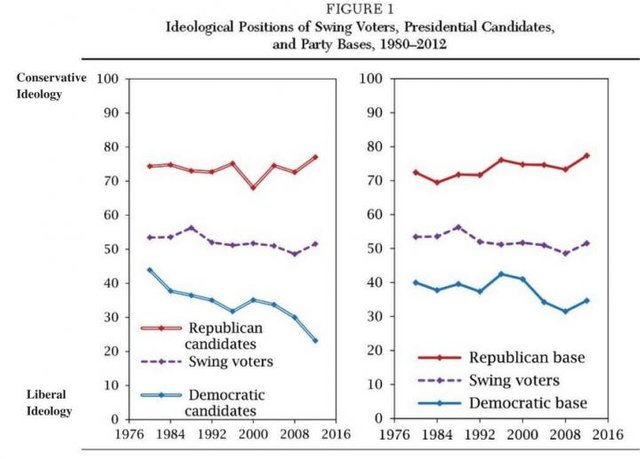Presidential Candidates Don't Put a Lot of Emphasis on Swing Voters’ Views
It's been a long-standing belief that candidates have to be appealing to the middle ground of the potential public voters to win an election. It’s common to see presidential candidates taking very moderate positions on many issues. It begs the question whether or not they are catering to their core supporters and their extreme views.
A new study has revealed that Republican candidates that are running for president are more responsive in general than Democratic presidential candidates to the views that are held by their base voters. On the other hand, neither of the candidates are very responsive to swing voters and their preferences even though these views are said to define the political core spectrum.
According to Larry M. Bartels, the author of the study from Vanderbilt University, extremism in presidential politics can be found with both Republicans and Democrats. His findings raise an alarm bell for people believing that swing voters' views should be responded to by presidential candidates.

This graph is showing "Ideological Positions of Swing Voters, Presidential Candidates, and Party Bases, 1980-2012". (Image credit: Bartels 2016)
In the study, Bartels ran a comparison of presidential candidates' positions from 1980 up to 2012 on many issues. It compared political issue positions to the preferences of core supporters and swing voters. Data from surveys conducted by American National Election Studies was used with a 100-point scale ranging from liberal to conservative and at the same time adding viewpoints on defense spending, African American aid, government jobs and government spending.
The conclusion made by Bartels was that the unresponsiveness of the candidates to swing voters cannot simply be viewed as a reflection of core party members and their influence. During recent years the bases of both parties have polarized with a larger shift seen in the Republican base. The positions of candidates are often more extreme than what is found in their core supporters.
Bartels also wrote that the idea that the positions of candidates reflect a compromise between swing voters' preferences and those of core partisans doesn't apply here. It could be that the positions actually reflect much smaller group influences such as those of big donors, strong policy demanders, liberal, grassroots or conservative organizations or activist groups instead of core partisans.
Like what you read (without annoying ads :) ) ? Then please upvote our posts and follow us for the best daily science news on SteemIt!

